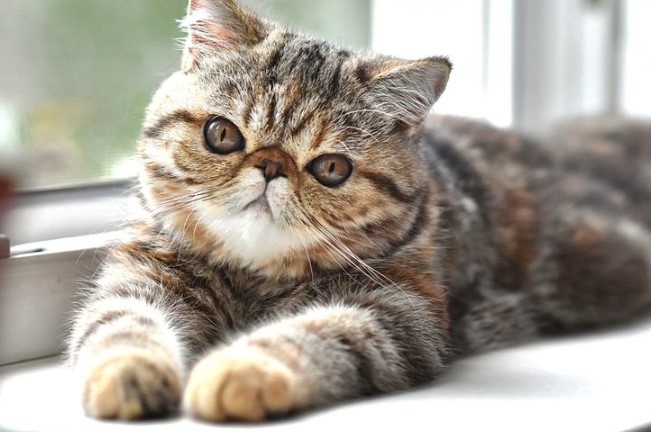Understanding the Exotic Shorthair Cat
The Exotic Shorthair cat breed, often dubbed as the “lazy man’s Persian,” shares many characteristics with its long-haired counterpart but with a shorter, more manageable coat. These cats are known for their laid-back demeanor and affectionate nature.
Why Exotic Shorthairs Stand Out
With their large, expressive eyes and squashed faces, Exotic Shorthairs possess an endearing charm that captures the hearts of cat lovers worldwide.
History and Origin
The Beginnings of Exotic Shorthair
The Exotic Shorthair breed originated in the 1950s in the United States when breeders sought to develop a cat with the Persian’s distinctive appearance but with a shorter coat.
Development of the Breed
Through careful selective breeding, breeders crossed Persians with American Shorthairs and other short-haired breeds to create the Exotic Shorthair we know today.
Physical Characteristics
Distinctive Features
Exotic Shorthairs share many physical characteristics with Persians, including their large, round heads, short noses, and small, rounded ears.
Coat Colors and Patterns
These cats come in a wide range of coat colors and patterns, including solid colors, bi-colors, and tabby patterns, adding to their visual appeal.
Body Structure
Exotic Shorthairs have a sturdy and muscular build, with a low-slung, cobby body and thick, short legs.
Temperament and Personality
Gentle Giants
Despite their somewhat serious appearance, Exotic Shorthairs are gentle and affectionate cats that enjoy spending time with their human companions.
Playful Companions
While they may not be as energetic as some other breeds, Exotic Shorthairs still enjoy interactive play sessions and toys that stimulate their natural hunting instincts.
Social Behavior
These cats thrive on companionship and enjoy being part of a family. They often form strong bonds with their owners and are known for their loyalty.
Care and Maintenance
Grooming Needs
Although Exotic Shorthairs have shorter coats than Persians, they still require regular grooming to prevent matting and keep their fur in good condition.
Exercise Requirements
While they are not as active as some breeds, Exotic Shorthairs still benefit from daily play and exercise to keep them mentally and physically stimulated.
Dietary Considerations
Feeding a balanced diet appropriate for their age and activity level is essential for maintaining the health and well-being of Exotic Shorthairs.
Health Concerns
Common Health Issues
Like all cat breeds, Exotic Shorthairs are prone to certain health conditions, including dental problems, respiratory issues, and polycystic kidney disease (PKD).
Preventive Measures
Regular veterinary check-ups, a balanced diet, and maintaining a clean living environment can help prevent common health issues in Exotic Shorthairs.
Veterinary Care
It’s essential to establish a good relationship with a veterinarian experienced in treating Exotic Shorthairs to ensure their health needs are met.
Exotic Shorthair vs. Persian Cat
Key Differences
While Exotic Shorthairs and Persians share many physical characteristics, the most obvious difference is their coat length.
Similarities
Both breeds have similar temperaments, with a reputation for being gentle, affectionate, and good-natured companions.
Exotic Shorthair as Pets
Ideal for Families
Exotic Shorthairs make excellent family pets, as they are generally good with children and enjoy being part of a household.
Apartment Living
Their laid-back nature makes them well-suited to apartment living, although they still appreciate access to a safe outdoor space if possible.
Compatibility with Other Pets
Exotic Shorthairs typically get along well with other pets, including dogs and other cats, especially if they are introduced to them at a young age.
Choosing the Right Exotic Shorthair
Breeder Selection
When choosing a breeder, look for one who prioritizes the health and well-being of their cats and can provide references from satisfied customers.
Adoption Considerations
Adopting an Exotic Shorthair from a rescue organization or shelter is another option and can be a rewarding experience.
Assessing Personality
When selecting an Exotic Shorthair, spend time with the cat to assess its personality and ensure it’s a good fit for your lifestyle and preferences.
Training Tips
Litter Box Training
Exotic Shorthairs are usually fastidious about their litter box habits, but consistent training is still essential, especially for kittens.
Basic Commands
While cats are not as trainable as dogs, Exotic Shorthairs can learn basic commands and respond well to positive reinforcement techniques.
Behavioral Training
Addressing undesirable behaviors early on through positive reinforcement and redirection can help prevent issues from developing in the future.
Famous Exotic Shorthairs
Internet Sensations
Several Exotic Shorthairs have gained fame on social media platforms like Instagram and YouTube, showcasing their adorable antics to millions of followers.
Celebrity Pets
Some celebrities are proud owners of Exotic Shorthairs, further boosting the breed’s popularity and visibility.
Pop Culture Appearances
Exotic Shorthairs have made appearances in movies, television shows, and commercials, solidifying their status as beloved feline celebrities.
Conclusion
The Exotic Shorthair cat breed combines the charm of the Persian with a more manageable coat length, making them a popular choice among cat enthusiasts. Their sweet temperament and distinctive appearance make them cherished companions for families and individuals alike.
FAQs About Exotic Shorthair Cats:
- Are Exotic Shorthair cats hypoallergenic? Exotic Shorthairs are not considered hypoallergenic, but their shorter coat may cause fewer allergic reactions in some people compared to the longer-haired Persian cats.
- Do Exotic Shorthairs require a lot of grooming? While Exotic Shorthairs do not need as much grooming as Persians, they still require regular brushing to keep their coat free of mats and tangles.
- Are Exotic Shorthairs prone to any specific health issues? Like all breeds, Exotic Shorthairs have some predispositions to certain health conditions such as polycystic kidney disease (PKD) and brachycephalic airway syndrome. Regular veterinary check-ups can help monitor and address these concerns.
- Do Exotic Shorthairs get along with children and other pets? Yes, Exotic Shorthairs are known for their gentle and tolerant nature, making them great companions for children and other pets in the household.
-
How much exercise do Exotic Shorthairs need? Exotic Shorthairs are not overly active cats, but they still benefit from daily play sessions and interactive toys to keep them mentally and physically stimulated.
